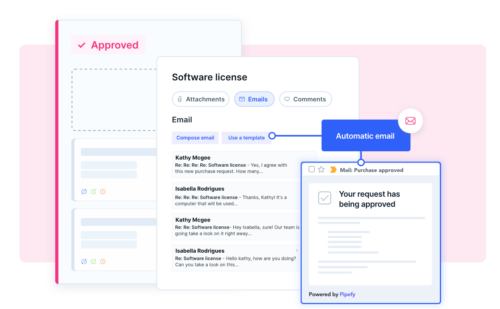
In a fast-paced digital transformation era, intelligent agents stand out as essential tools for companies seeking efficiency, innovation, and a competitive edge.
Acting as autonomous tools, these agents combine artificial intelligence and automation to perform tasks, freeing employees to focus on more strategic activities.
With capabilities ranging from workflow automation to advanced analytical insights, intelligent agents offer customization, efficiency, and agility, optimizing corporate operations across various sectors.
Curious about how they work and how they can transform your business? Keep reading to discover their practical applications and the benefits they bring to day-to-day operations.
The role of intelligent agents
Intelligent agents are autonomous systems designed to integrate artificial intelligence (AI) into corporate environments, optimizing processes and supporting human teams. They can be programmed to execute specific tasks, learn from data, and adapt to the company’s needs and demands.
Their applications in the corporate sector are vast. Whether automating operations, providing strategic support via analytical data, or personalizing customer interactions, intelligent agents not only increase efficiency but also add value to operations through flexibility and precision.
How AI is redefining the workplace
The integration of AI into companies has redefined productivity. A study by Forrester Consulting found that organizations implementing autonomous agents via Pipefy observed a growth of up to 40% in operational efficiency within two years.
This evolution involves replacing manual processes with adaptable intelligent tools, streamlining workflows, and adding value to teams without sidelining the role of employees.
Unlike basic automation, intelligent agents learn, interpret scenarios, and respond to contextual changes, ensuring that companies remain competitive and innovative.
The importance of adaptability
Digital workers, designed to adapt quickly to market demands, are one of the biggest assets of digital transformation. They automatically adjust processes based on new demands, data patterns, and operational changes, making them indispensable in dynamic scenarios.
In today’s competitive environment, the ability of digital workers to respond to change ensures operational flexibility and consistent performance for your company.
Financial sector
Intelligent agents have a significant impact on critical areas of a company, such as finance, HR, sales, and procurement. By personalizing solutions and delivering tailored results, they optimize organizational efficiency across sectors:
In finance, intelligent agents optimize complex tasks like bank reconciliations, cash flow forecasting, and identifying patterns that indicate financial risks.
Using Pipefy, Sofisa Bank centralized its financial requests, automating triages and eliminating common manual errors. This automation resulted in a 95% improvement in on-time service delivery.
Automation agents
How do intelligent agents operate?
Automation agents are used to create consistent workflows in the financial sector. They streamline payments, automatically integrate data, and eliminate bottlenecks, ensuring precision at every stage.
Human resources
Intelligent agents simplify essential HR tasks, such as resume screening, onboarding new employees, and managing benefits.
With Pipefy, JazzHR automated recruitment and onboarding workflows, achieving a 80% reduction in onboarding time for new hires. This allowed the HR team to focus more on people-oriented strategies.
Service agents
Chatbots and virtual assistants automate responses to frequently asked questions, reducing time spent on administrative tasks and creating efficiencies in employee support.
Procurement
In procurement, digital workers support budget analysis, automate approvals, and generate real-time reports.
After integrating Pipefy with its ERP system, Samsonite automated purchase requests, saving more than 2,370 hours of manual work in five months and achieving an ROI of 177%.
Analytical agents
Analytical agents process large volumes of data to predict demands, identify bottlenecks, and provide strategic insights for supplier negotiations.
Key benefits in daily operations
Implementing intelligent agents delivers practical and tangible improvements in everyday business activities. Here are some of the most significant benefits:
Workflow optimization
By automating repetitive tasks, intelligent agents bring speed and consistency to processes. Beyond saving time, they allow human teams to focus on strategic activities.
Reduced error margins
Automation enables autonomous agents to significantly reduce operational errors during manual processes, increasing reliability in results and enhancing data-driven decision-making.
Personalization
Digital workers enable highly personalized options, whether for client interactions or internal operations, providing solutions based on real-time data and context.
Why Pipefy is the ideal ally for intelligent automation
Pipefy stands out as a strategic partner for companies looking to efficiently and seamlessly implement intelligent agents.
With its intuitive no-code platform, Pipefy simplifies automating and organizing workflows across different sectors, ensuring that digital workers are accessible to all employees.
Intelligent agents with Pipefy
At Pipefy, intelligent agents can assist in automating processes such as request management, financial reporting, and employee screening. Without requiring programming knowledge, leaders and teams can configure, monitor, and manage workflows, democratizing access to technology and improving efficiency at all levels of your company.
Integrate Pipefy into your organization to transform processes and take your operation to new levels.
Discover how intelligent agents in Pipefy can transform your business. Schedule a free demonstration today!






